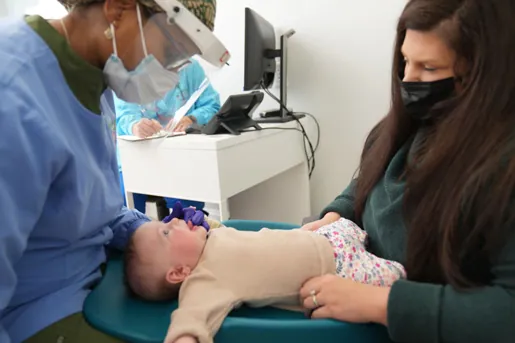Infants & Oral Health
I am pregnant. What is the best way to care for my teeth?
The American Academy of Pediatric Dentistry recommends that all pregnant women receive oral health care and counseling during pregnancy. Some oral conditions, such as periodontal disease, can increase the risk of pre-term birth and low birth weight. We recommend that you:

- Visit the dentist regularly.
- Brush and floss daily.
- Maintain a healthy diet.
- Use a fluoridated toothpaste and rinse each night with an alcohol-free, fluoridated rinse.
- Do not share utensils, cups or foods with your children. This may transmit harmful bacteria from your mouth to your child’s.
- Use xylitol chewing gum (four pieces a day) to decrease your child’s risk of cavities.
When Should I Schedule My Child’s First Dental Visit?
By their first birthday or when their teeth begin to appear. This initial visit helps establish a baseline for their oral health and introduces them to our team and the dental environment. This is also a great opportunity for parents to ask questions and allows us to provide education, so you know what to expect as your child grows and develops.
Why should I establish a “dental home” for my child?
Children who have a dental home are more likely to receive appropriate preventive and routine oral health care. Your child should visit a pediatric dentist after their first tooth comes in, or around their first birthday.
When will my baby start getting teeth?
Baby teeth typically begin erupting at about 6-8 months.
What is early childhood caries?
Early childhood caries is also known as baby bottle tooth decay. It is caused by frequent and prolonged exposure of an infant’s teeth to sweetened or sugary liquids, such as breast milk, formula and fruit juice.
We recommend that you do not put your baby to sleep with a bottle. If your child insists on having a bottle, make sure that it contains only water. If your child will not fall asleep without the usual beverage, gradually dilute the contents of the bottle with water over a two to three week period.
After each feeding, gently wipe your baby’s gums and teeth with a damp washcloth or gauze pad to remove plaque.
For soon-to-be or recent mothers who have additional questions about their child’s early oral care, we welcome you to contact our dental office in Charlotte, North Carolina, at 704-688-1664 and talk with Dr. M. Danielle Funny. Our pediatric dentist and team at University Pediatric Dentistry are highly trained and knowledgeable and happy to answer your questions.
